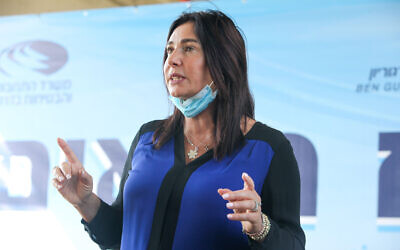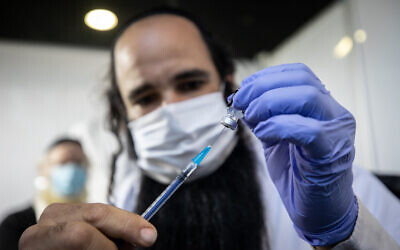The government on Sunday decided to allow Israelis to arrive from any destination with the aim of enabling citizens to reach the country in time for next week’s elections.
Previously, Israelis could only take incoming flights from a shortlist of destinations in the US, Europe, and the Far East.
However, the government kept in place a limit of no more than 3,000 arrivals each day, a restriction aimed at preventing new mutations of the virus from coming in with travelers.
Health Minister Yuli Edelstein in particular was adamant that the cap remain, warning that coronavirus infection numbers would quickly rise again without it, according to Hebrew media reports of leaks from the cabinet meeting.

Medical technicians test passengers for COVID-19 at the Ben Gurion International Airport near Tel Aviv on March 8, 2021 (Avshalom Sassoni/Flash90)
The move came as the government was preparing to respond to a High Court petition against the 3,000-person limit later in the day, the Kan public broadcaster reported.
Attorney General Avichai Mandelblit, who had pushed for the limit to be raised to 4,000 in order to better argue the case in court, said that opening all departure points would help the government’s position, according to the report.

Transportation Minister Miri Regev visits a new coronavirus laboratory, at Ben-Gurion International Airport, near Tel Aviv on November 9, 2020. (Yossi Aloni/Flash90)
So far, with only limited departure points permitted, the number of actual daily entries has reportedly not reached the upper limit. But Transportation Minister Miri Regev assured the cabinet that authorities will be able to handle the situation if the number of arrivals does reach that rate.
However, Regev also said Sunday at the Besheva Group’s conference in Jerusalem that some flights to Israel had already been canceled because there was no demand for those routes.
Israel’s land and air gateways have been largely closed since January 25, leaving thousands unable to return. Ben Gurion Airport has been shuttered for all but a few special flights by Israeli and some foreign airlines to bring back citizens stranded abroad. There are estimated to still be tens of thousands of Israelis who were left stranded abroad and struggling to return in time for the March 23 elections.
The discussion came during cabinet discussions on further easing of restrictions amid falling infection and transmission rates.

Israelis enjoy the beach in Tel Aviv on March 13, 2021 (Avshalom Sassoni/Flash90)
Speaking earlier in the day to the Kan public broadcaster, Edelstein said it appeared there would be no reason to apply any restrictions for the coming Passover holiday, an annual event that sees many Israelis gather together for large family meals.
“We have pushed the coronavirus into a corner,” he said, pointed to the more than five million people who have been given at least the first dose of the vaccine.
“The figures are very encouraging for a few days already,” Edelstein said. “Nearly everything is open [from lockdown]. We must remember that everyone must still keep to the basic rules.”
Education Minister Yoav Gallant called on Sunday for the opening of schools in so-called red zones — places that have the highest rates of virus infection. Schools in those areas are the last to remain closed after those in “orange” areas also fully opened on Sunday.

Education Minister Yoav Gallant holds a press conference in Tel Aviv, August 6, 2020. (Avshalom Sassoni/Flash90)
“Thousands are watching soccer matches, walking around in markets, malls, and restaurants, — our students deserve more, they are our future,” Gallant tweeted.
The developments came as Health Ministry figures showed there were just 773 new virus cases diagnosed on Saturday, and that the virus reproduction number, a key indicator of the outbreak, continued to drop and stood at 0.78%.
Though testing and diagnosis rates tend to be significantly lower over the weekend, the caseload was less than half the 1,878 infections detected last Saturday. The last time the daily cases were so low was on Saturday, November 28, when just 582 cases were found.
In addition, the rolling seven-day average dropped to 2,700, the lowest figure since December 20 when it stood at 2,473.
The positive result rate for virus tests remained at 2.9%, the same as for Friday, a low rate not seen since early December.
Since the start of the outbreak, 818,154 people have been diagnosed with the coronavirus in Israel and there are 32,007 active patients, according to the Health Ministry data, released Sunday.
There are 644 COVID-19 patients in serious condition and with an additional ten deaths, the toll reached 5,992.

People eat at a restaurant in Jerusalem’s main market after authorities reopened restaurants, bars and cafes to ‘green pass’ holders on March 11, 2021. (Emmanuel DUNAND / AFP)
Eran Segal, a computational biologist at the Weizmann Institute of Science, tweeted Sunday that the virus reproduction number is falling at a much faster rate than it did when Israel exited its previous lockdown, which was considered by many experts to be too hasty and to have led to a third wave of infections.
Segal said the country is now seeing 35% fewer infections per week in comparison to when the lockdown restrictions were first eased, just over a month ago.
The second lockdown, which ran for a month from mid-September last year, saw infection rates begin to climb as soon as restrictions were lifted, and reached 18% more virus cases per week in 30 days, Segal said.
The falling infection rates came as a national vaccine campaign continued, with 5,129,901 people having already received the first shot of the vaccine, and 4,134,860 have had the second.

Illustrative: A medical worker prepares a COVID-19 vaccine at a Clalit vaccination center in Jerusalem on February 25, 2021. (Olivier Fitoussi/Flash90)
A national taskforce advising the government on dealing with the COVID-19 pandemic reported Sunday that the vaccine is particularly effective for those who have recovered from coronavirus infection.
The taskforce stressed that those who have recovered are still in danger of becoming reinfected with new strains of the virus, such as a South African mutation already detected in Israel and another that is sweeping across Brazil.
It advised those who have recovered to get inoculated and cited the US Centers for Disease Control as saying there are no known dangers in vaccinating those who have recovered.
The taskforce said that even one dose of the vaccine greatly improves a recovered patient’s defense against known variants and that there are first reports that the vaccine can also help reduce the effects of so-called “long COVID,” patients who continue to suffer from a range of symptoms even after they are no longer infected with the virus.
 RSS Feed
RSS Feed















 March 14th, 2021
March 14th, 2021  Awake Goy
Awake Goy  Posted in
Posted in  Tags:
Tags: 













